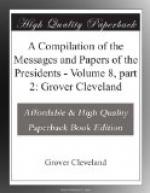The unfortunate but unavoidable difficulties that opposed a timely compliance with the terms of the Algerine treaty are much to be lamented, as they may occasion a temporary suspension of the advantages to be derived from a solid peace with that power and a perfect security from its predatory warfare. At the same time, the lively impressions that affected the public mind on the redemption of our captive fellow-citizens afford the most laudable incentive to our exertions to remove the remaining obstacles.
We perfectly coincide with you in opinion that the importance of our commerce demands a naval force for its protection against foreign insult and depredation, and our solicitude to attain that object will be always proportionate to its magnitude.
The necessity of accelerating the establishment of certain useful manufactures by the intervention of legislative aid and protection and the encouragement due to agriculture by the creation of boards (composed of intelligent individuals) to patronize this primary pursuit of society are subjects which will readily engage our most serious attention.
A national university may be converted to the most useful purposes. The science of legislation being so essentially dependent on the endowments of the mind, the public interests must receive effectual aid from the general diffusion of knowledge, and the United States will assume a more dignified station among the nations of the earth by the successful cultivation of the higher branches of literature.
A military academy may be likewise rendered equally important. To aid and direct the physical force of the nation by cherishing a military spirit, enforcing a proper sense of discipline, and inculcating a scientific system of tactics is consonant to the soundest maxims of public policy. Connected with and supported by such an establishment a well-regulated militia, constituting the natural defense of the country, would prove the most effectual as well as economical preservative of peace.
We can not but consider with serious apprehensions the inadequate compensations of the public officers, especially of those in the more important stations. It is not only a violation of the spirit of a public contract, but is an evil so extensive in its operation and so destructive in its consequences that we trust it will receive the most pointed legislative attention.
We sincerely lament that, whilst the conduct of the United States has been uniformly impressed with the character of equity, moderation, and love of peace in the maintenance of all their foreign relationships, our trade should be so harassed by the cruisers and agents of the Republic of France throughout the extensive departments of the West Indies.




